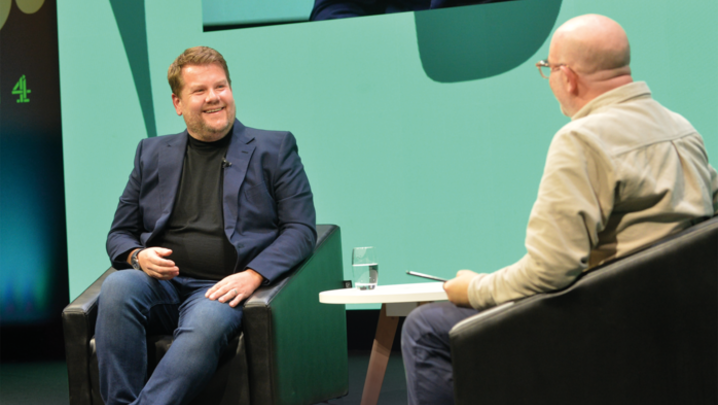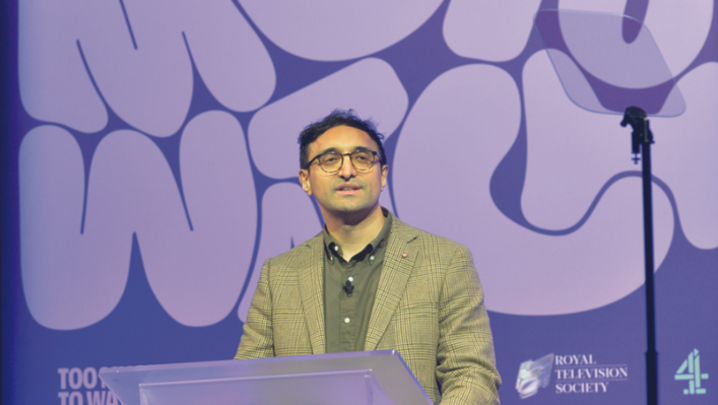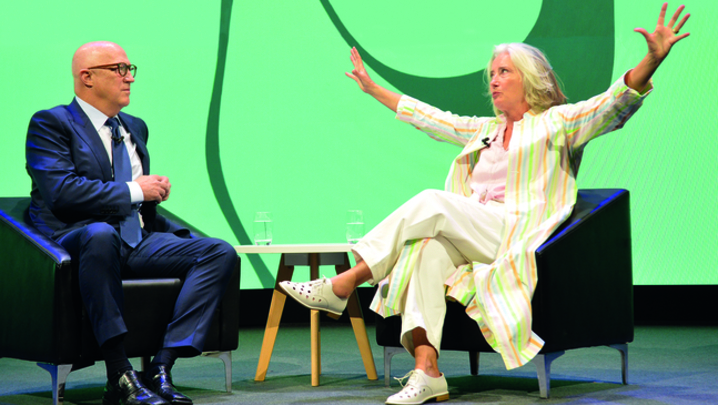Julie Graham shares with the RTS how she created an original online drama with a little help from some famous friends
When the going gets tough, the tough get going.” The 1980s Billy Ocean lyric, no doubt part of the soundtrack to the teenage lives of the six menopausal women in new, Brighton-set “drama-with-funny-bits” Dun Breedin’, could be the mantra of its creator, Julie Graham, who starred in ITV’s Benidorm.
She and Andrew Green, a co-founder of Blonde To Black Pictures Two, made the series featuring a cast of six – plus extras – on six different sets, with no crew, just basic lighting and sound and a camera kit consisting mainly of iPhone 7s, while keeping to lockdown guidelines. And all in three weeks.
Produced by Jackie Green and Claire Baylin of Manic Butterfly Productions, Dun Breedin’ recounts the lives, loves and losses of six friends, putting women’s sexuality, agency and worth under the spotlight.
The star-studded cast includes EastEnders’ Tamzin Outhwaite, Tracy-Ann Oberman and Alison Newman, alongside Coronation Street’s Angela Griffin and Denise Welch.
In April, Welch, with her “presenter’s hat on”, joined Graham, Griffin and Dun Breedin’s Bafta-nominated director, Robin Sheppard, whose credits include Harlots and Benidorm, for a lively RTS North West online discussion. Graham said: “I was developing it as an eight-part, half-hour series when [Andrew] had this mad idea to start filming it virtually, in 10-minute chunks, and putting it out almost like tasters.”
The 12 10-minute episodes began streaming on 30 April on YouTube, landing every subsequent Thursday at 3:00pm. Viewers are encouraged to donate to the Trussell Trust, which supports food banks.
“What was wonderful was that every single person I got in touch with said yes,” said Graham. “It’s amazing that everybody wanted to put their neck on the line [in the sense that] it was an experiment and a huge learning curve.
“We just wanted to do something creative. For actors, [lockdown] has been very frustrating.… We can’t just go out into the street and start acting at people, we’d get carted away. I wanted to do something that would utilise the time in this very strange world that we’re living in.”
“I’d been playing the part of ‘Isolation Ange’ in a series called ‘Lockdown’,” Griffin joked. “[Just before Julie’s call came,] I’d decided I didn’t want to be in that series any more. So, the second I got the call, I grabbed it with both hands.”
Welch explained that although it was “filmed in lockdown, it’s not about lockdown”, which meant that Graham and Sheppard “had to be very inventive about how we brought all these characters together. There’s lot of FaceTime, a lot of us on our own, or working with our families.”
Sheppard outlined the concept: “The cast film in their own homes using members of their family as crew and actors. So there’s no crossover of any characters in reality; and no people, no crew members, coming into those homes.”
She praised the actors for embracing the slightly scary new way of working: “There’s no make-up artist, wardrobe, continuity, DoP, sound recordist, no one… to put the microphones in your clothes.”
The actors shot their scenes themselves. “And, for it all to cut together like a finely made Italian skirt,” said Sheppard, “I gave them all a very detailed shot list, floor plans to show where the camera should be so that all the eyelines were right and… visual diagrams. I have to say, the results are spectacular.”
“The FaceTime calls are actually quite complicated to film,” she added. “All the eyelines need to be right so it doesn’t look like people are looking in the wrong direction.”
Transgressions are known as “crossing the line”. Welch joked: “It’s like the offside rule – no matter how many times somebody explains it, I still don’t understand.”
From Sheppard’s perspective, “every single household is a little independent film-making unit. For instance, [Griffin’s daughter] Tallulah is a budding film-maker and she’s like having a mini-me on the set at Angela’s house.… I find that personally really inspiring.… It’s really great for the kids, because lockdown is psychologically tough, and we’re keeping them busy and learning.”
Griffin added that it had been an “opportunity to get involved in the technical side of things in what felt like quite a safe way”, producing something that was “funny, cool and current – it’s relevant”.
Welch agreed. “Menopause is this taboo subject that no one likes to talk about, when it’s something that all women go through.” Like all taboo subjects, “if you make it funny, then people are going to learn more about it while laughing.”
That was the appeal of Graham’s scripts. “A big bugbear of mine is that the menopausal woman is always the butt of a joke – the harridan or battle-axe, a figure of ridicule, usually from the male gaze – and it’s not reflective of what it’s actually like to be an older woman,” she said. “In this industry, there aren’t the opportunities for the older [female] actor. The roles don’t exist.… The project was borne out of the sheer frustration of not being represented. It’s a very personal project for me.”
Sheppard added that “because of the way we’re making this show - filming in people’s homes – the intimacy you get between this bunch of women really comes across strongly on the screen.… I felt, ‘Oh my God, for the first time, I’m seeing women talk to each other in the way they do in real life’.”
Welch asked Sheppard if she thought what they were doing would change the way television drama was made. “We are in the situation we are in, and what I love about this is we are being bold and brave and going out there like pioneers and finding a new way of doing things.… While we’re in the ‘waiting room’, why not be very productive?”
She had a message for younger women as well: “Only 7% of directors are women… there’s still so far to go. To all the girls out there, if you have a phone and a story to tell, go and shoot something.”
Griffin agreed: “There are lots of free editing apps and you can edit it and make it look professional, add sound, and put music on.”
“Making television requires such an extraordinary collaboration and it’s so highly skilled. I have so much respect for crews,” insisted Graham. “But this industry can be hard to break into, it can feel very daunting. So, if it inspires anyone to write, produce and direct their own vision… it’s doable.”
Green , who executive produced the series, said that if anyone wanted advice from him on how to further their career in film-making, they could contact him directly.
Welch wrapped up the session by stressing how important it was for Graham to use Dun Breedin’ to raise money for the Trussell Trust.
“Unfortunately, during this terrible lockdown, this [network of food banks] has become a frontline service. It’s where so many children get the hot meal that they’d ordinarily get at school,” she explained. “We wanted to raise awareness of that because the show is essentially about women and families… If you can’t give [Trussel Trust] money or food, you can volunteer or fundraise with your family for it.”
Report by Carole Solazzo. The Dun Breedin’ online event on 11 May was produced for RTS North West by Rachel Pinkney.







